“Firm in the Faith of Christ”
Alma 43–52
LDS manual: here
Purpose
To explain why apostates are so dangerous to the church, and to investigate whether a common criticism of the Book of Mormon has any validity
Reading
Man, if this reading isn’t a stinker. The Book of Alma has a reputation for being tough to get through, and this reading is part of the reason why. It concerns the Nephite/Lamanite wars, and would really only be of interest to someone from that area and time.
The LDS Gospel Doctrine manual seems to sense the tension in the room for this lesson, and tries to forestall it by asking:
• Why do you think Mormon included so much information about war in the Book of Mormon?
Because war stories are easy to write?
1. Mormon knew that the Book of Mormon would be read and studied in a time when war would be common throughout the world. These writings teach us how to remain Christlike during times of conflict.
Actually, war is less common now than at any time in earth’s history.
“War” is a fuzzy category, shading from global conflagrations to neighborhood turf battles, so the organizations that track the frequency and damage of war over time need a precise yardstick. A common definition picks out armed conflicts that cause at least 1,000 battle deaths in a year — soldiers and civilians killed by war violence, excluding the difficult-to-quantify indirect deaths resulting from hunger and disease. “Interstate wars” are those fought between national armies and have historically been the deadliest.
These prototypical wars have become increasingly rare, and the world hasn’t seen one since the three-week invasion of Iraq in 2003. The lopsided five-day clash between Russia and Georgia in 2008 misses the threshold, as do sporadic clashes between North and South Korea or Thailand and Cambodia.
And:
In fact, virtually all the war in the world is now confined to an arc stretching from Nigeria to Pakistan, which contains less than a sixth of the world’s population. We are hardly, as pessimists like to say, a “world at war.” Of course, the world continues to suffer from other forms of violence: terrorist bombings that kill dozens, drug gangs that kill thousands, and homicides that kill hundreds of thousands. But the latest inroads against a major category of violence — war — after five years in which it had lurched in the wrong direction, deserves our attention and gratitude.
What else you got, LDS manual?
2. Mormon recorded Nephite history preceding the Savior’s appearance in great detail. We can read of the Nephites’ experiences and be prepared for similar events occurring in our day prior to the Second Coming of Christ.
Ah, yes — the Second Coming. Seems like they’ve been saying it’s on its way ever since I was a young tacker. The last and chosen generation before Christ’s triumphant return, and all that. When is that going to happen?
Oh, look: not for a while yet.
The end is not near, senior LDS apostle Boyd K. Packer said Saturday.
Today’s youths can look forward to “getting married, having a family, seeing your children and grandchildren, maybe even great-grandchildren,” Packer told more than 20,000 Mormons gathered in the giant LDS Conference Center in downtown Salt Lake City.
Isn’t that a hoot? The name of the church has “Latter-day” in it, and now one of its leaders says the Second Coming has been called off due to lack of interest. Or maybe it’s because they’ve just built a mall and they’ve got to recoup.
I see these war chapters as a missed opportunity. Remember, the Book of Mormon was God’s best shot at re-establishing his revelatory link with humanity. He could have told us anything! There we were, at the cusp of the humankind’s great leap into the Scientific Age, and God could have dropped in some nuggets that we were about to discover. What if the Book of Mormon had gotten the jump on Einstein and Bohr? That would have made believers out of a great many people.
Instead, we get pointless war stories.
Alma 49:24 There were about fifty who were wounded, who had been exposed to the arrows of the Lamanites through the pass, but they were shielded by their shields, and their breastplates, and their head-plates, insomuch that their wounds were upon their legs, many of which were very severe.
Was severe leg injuries really the best God could come up with?
Main ideas for this lesson
Why do we fight?
There’s a lot in this reading, but it’s so boring, I’m not going to go through it like a regular lesson. Instead, this lesson will touch on a pertinent question from the LDS Gospel Doctrine manual.
• Some of the strongest opponents of the Nephites had once been Nephites themselves, including the Amalekites (Alma 24:29–30; 43:6–7), the Zoramites (Alma 30:59; 31:8–11; 43:4), Amalickiah (Alma 46:1–7), Morianton (Alma 50:26, 35), and Amalickiah’s brother Ammoron (Alma 52:3). Why do those who have left the Church often fight so strongly against it? (See Mosiah 2:36–37; Alma 47:35–36.)
The Prophet Joseph Smith made the following statement to a man who wondered why those who had left the Church often fought so fiercely against it: “Before you joined this Church you stood on neutral ground. When the gospel was preached good and evil were set before you. You could choose either or neither. There were two opposite masters inviting you to serve them. When you joined this Church you enlisted to serve God. When you did that you left the neutral ground, and you never can get back on to it. Should you forsake the Master you enlisted to serve it will be by the instigation of the evil one, and you will follow his dictation and be his servant” (in “Recollections of the Prophet Joseph Smith,” Juvenile Instructor, 15 Aug. 1892, 492).
“And you shall be in my power! Muhahahahahaaaa!!!”
No, but seriously.
Let me try to explain why I fight the church so hard after being devoted to it for so many years.
I was raised in the church. For thirty-eight years, I went to weekly three-hour meetings, served a two-year mission, served in callings, and went to early-morning seminary classes. (How many years is that? You do the math.) Through it all, the church carefully wove a web that influenced the whole of my life. It taught that it was the Lord’s kingdom on the earth, and that if I was obedient, I could have an eternity with my family in heaven.
Sometimes things wouldn’t make sense. There would be contradictions. And when that happened, I didn’t worry, and I didn’t doubt. I would simply invent a workable explanation. Or I would place the item on my shelf, reasoning that I would find out after I died. Because, no matter what else, I knew the church was right. That was the one thing I knew.
In 2005, when I was struggling for answers, and everything appeared in shades of gray instead of black and white, I still believed. The idea that the church might be wrong was the last thing I wanted to think. I tried every other option, through every contradiction.
But when I allowed myself to serenely and honestly contemplate that last and final possibility — that the church was wrong — all the contractions folded up and disappeared, resolved at last. There were no contradictions. The complex and byzantine tower of faith that I had spent years constructing simply collapsed into a pile of dust at my feet.
The next few weeks at church were strange. In discussions about Noah’s Ark, the Millennium, the Creation — every time some doctrine was taught, I thought: All the people in this room are wrong about this.
The church was not what it taught me it was. It held itself up as the One True Church with living prophets, and it was just another human-made organisation.
And when you realise that — once you get past the shock — then comes the anger.

Because once you really grasp that the church isn’t what it claimed, you realise that someone’s been doing a whole lot of lying.
But who? Parents? The missionaries? No, they probably believe it. They’re not to blame.
The First Presidency and the Quorum of the Twelve? (We have this discussion a lot, we exMo’s.) Does the Q15 really believe it, or are they fooled as well?
One thing’s for sure: whoever wrote the Book of Mormon knows that they sat down and wrote it. And if the Q15 don’t know it’s wrong, they’re in a position to. Not knowing seems like criminal negligence.
What I’m saying is there’s a lot of anger, and it’s not clear whom to put it on.
And the wasted time and money! And the guilt they used on me. The way they shamed me about my body, my sexuality, and my desires. They claimed authority over the things that were closest to me. And the way they gave me a fake moral system to follow instead of something based in the real world. And the bad choices I made based on bad information. And on and on. You never really get through it. You just sort of keep rediscovering ways in which the worldview you cultivated was fake.
The closest thing I can imagine to it is discovering your spouse has been unfaithful. I’m not saying that’s a deal-breaker for everyone or anything. But imagine: you thought it was one way, and it was another. The reality you based your life on was a lie. And now you have to rediscover what reality is.
So that’s why I do what I do. I don’t have any delusions that I can bring the church down, but I do hope to contribute to the hollowing-out that I think is happening. And if someone finds themselves in my position, maybe they’ll see me and I can encourage them.
This stuff is kind of personal, and I can see we’re going over time. So I’ll end this bit here.
Let me ask the opposite question, just to finish off: why does the church fight its apostates so hard — to the point where they say that we’re enlisted with the evil one, and we’re his servants? Why are church members conditioned to shut down whenever one of us speaks?
Easy. Because we’re dangerous to the church. We know their mind games, because we’ve seen them all — and used them on ourselves. Who could be more dangerous to the Wizard of Oz than the ones who know all his tricks, and are happy to call them out for anyone listening?

Damn straight, JD.
I want to give a special shoutout to NewNameNoah, who has been happily exposing the secrets of the LDS Church to anyone who would like to see them. Through the magic of hidden video, he has recorded the temple ceremonies, and placed them onto YouTube. People who were about to join the church have watched them, and said “No, thanks.” You can strike a blow for transparency and openness of information by linking to them here.
Additional lesson ideas
Book of Mormon place names
There’s an argument against the Book of Mormon that I’ve never been fond of. It’s that Joseph Smith (and co.) simply grabbed a lot of local place names when they were trying to come up with place names in the Book of Mormon. This idea is stated most clearly in the CES Letter (which is fantastic, and which has helped a lot of people).
It shows up on page 9.
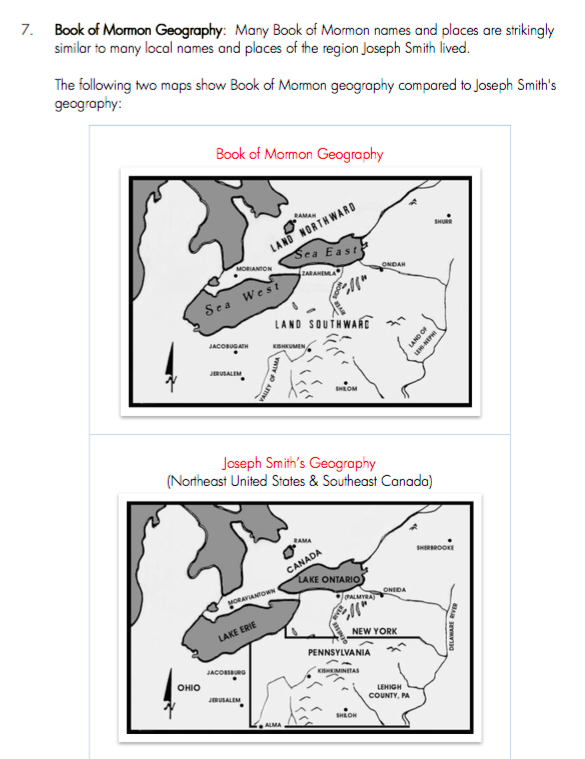
Here are the maps.
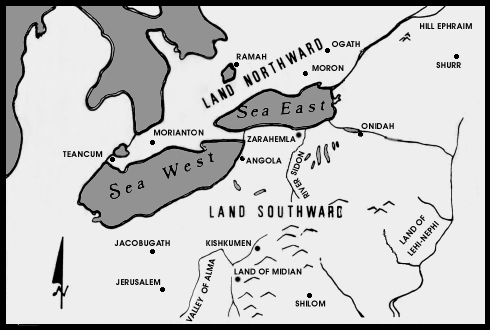
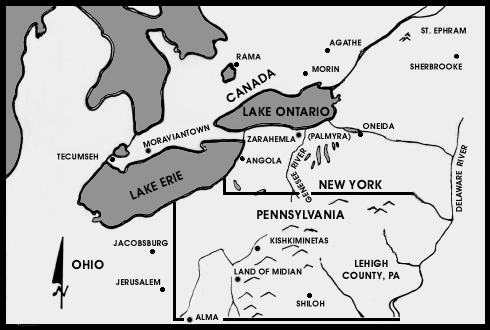
The CES Letter continues:

Like I say, I’ve never been fond of this argument. Here’s why:
1. How close is close, for place names? Sure, the list looks compelling by the ol’ eyeball method, but can we use such a metric? Isn’t that what Mormon apologists do when they look at an inscription that says NHM and claim a match for Nahom?
2. There are a lot of similarities. But that’s to be expected when you cherry-pick. How many modern names were left off? How many Book of Mormon names? It would be easy to assemble a list of matches from just about anywhere.
That’s the root of my argument: It would be easy to take any random place, and match up Book of Mormon place names to it. To show this, I’m going to pick a random spot on the map, compare the place names to a list of Book of Mormon place names, and match as many as I can. I predict that I’ll get a healthy list of matches, no matter where I plop down a pin, which would mean that the plagiarism charge is not really reasonable. If, however, I can’t get a list of matches, I’ll have to admit that maybe there’s something to this.
But back to my first question: how close is close? Well, let’s keep in mind that different places are going to have their own ways of making words. There may be different suffixes that might get in the way. So I’m going to play this loosey-goosey. I’m going to be super tolerant of differences in the vowels, and I’ll probably even allow some consonants to drop out. It seems to me that only the first two or three consonants are significant. If there’s a place name like Bunbury, I’ll be looking for anything with B*n*b, or even B*n. For Adelaide, I’ll be happy if I get any vowel up the front, plus D*L. After all, that’s about as rigorous as what I think the inventor of our chart did.
So here we go: Malaysia. Here’s the zone.
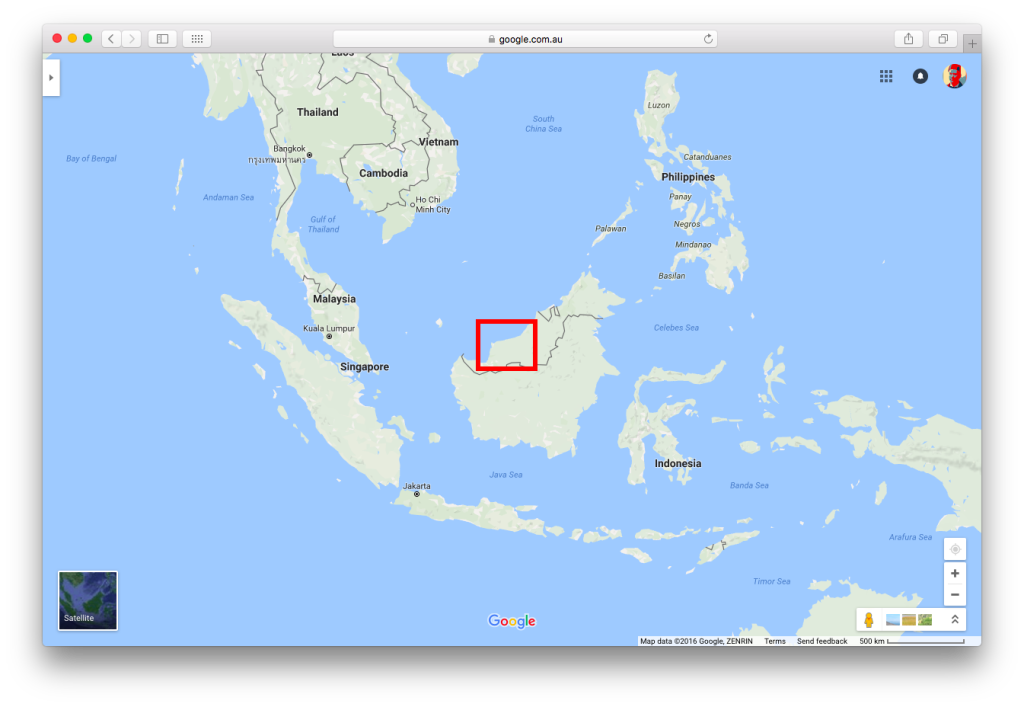
Let’s zoom in for some detail on place names.
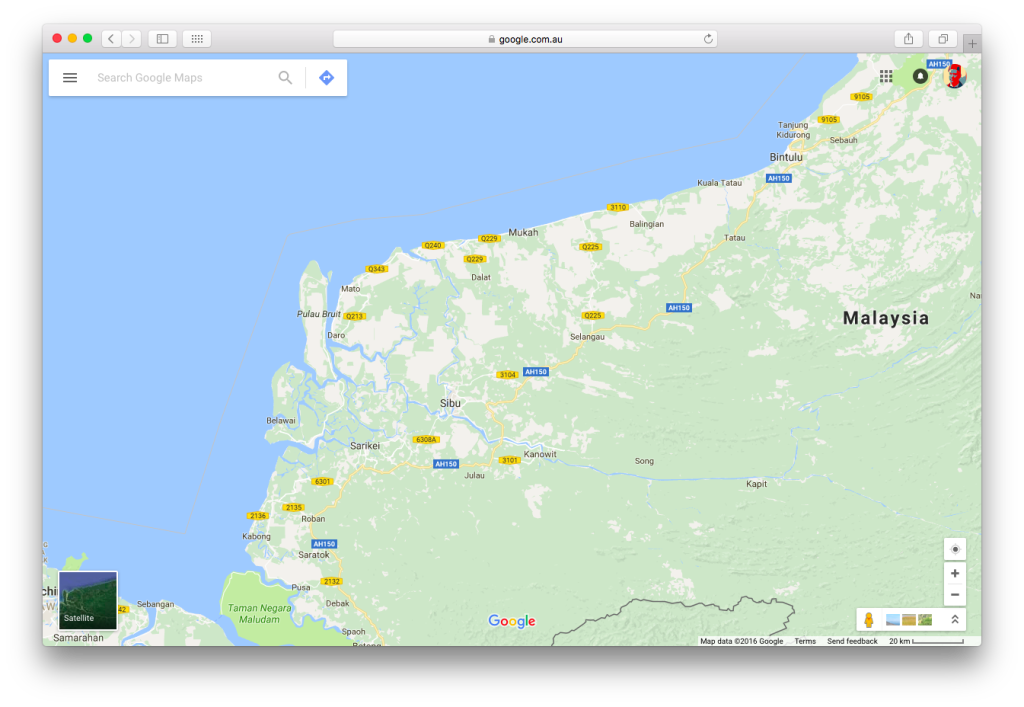
I should be able to find something. Hmm…
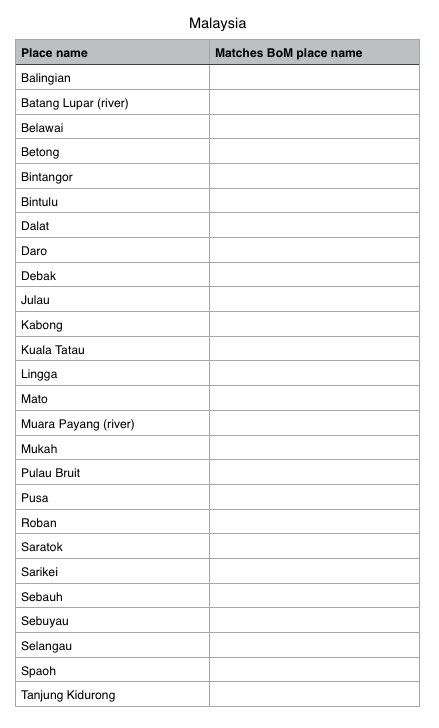
I can’t find one crappy name that looks even remotely close. Bintangor and Bethabara ain’t exactly a match.
But that’s just one place. I bet I’ll have better luck with some of the former Soviet republics.
Here’s the long view, in case you want to try.
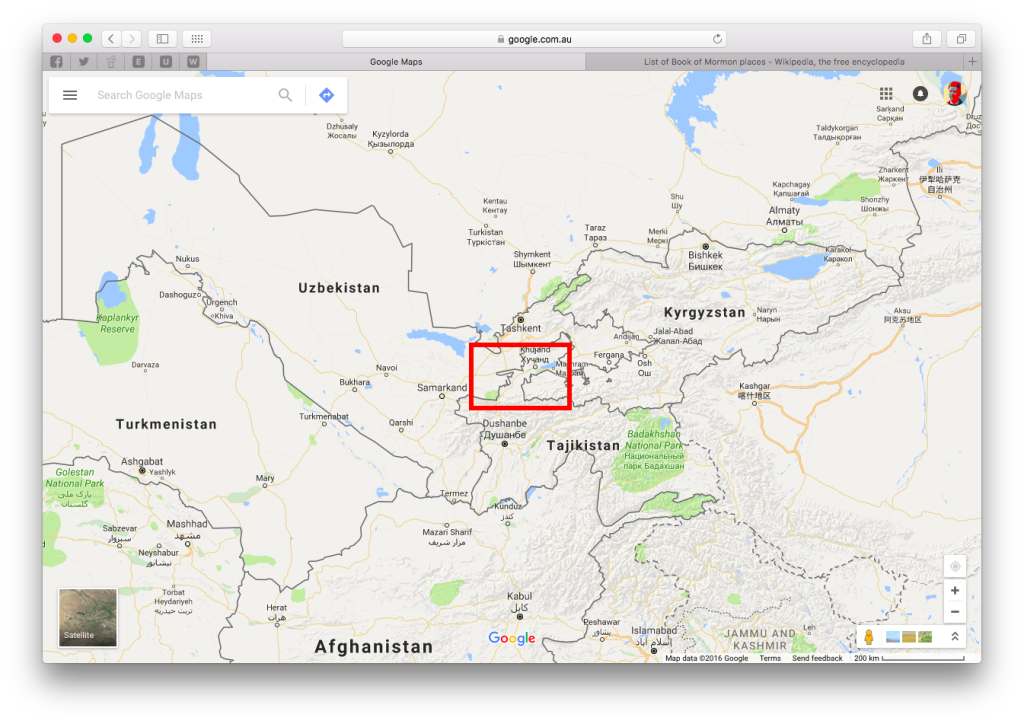
and the zoom in.
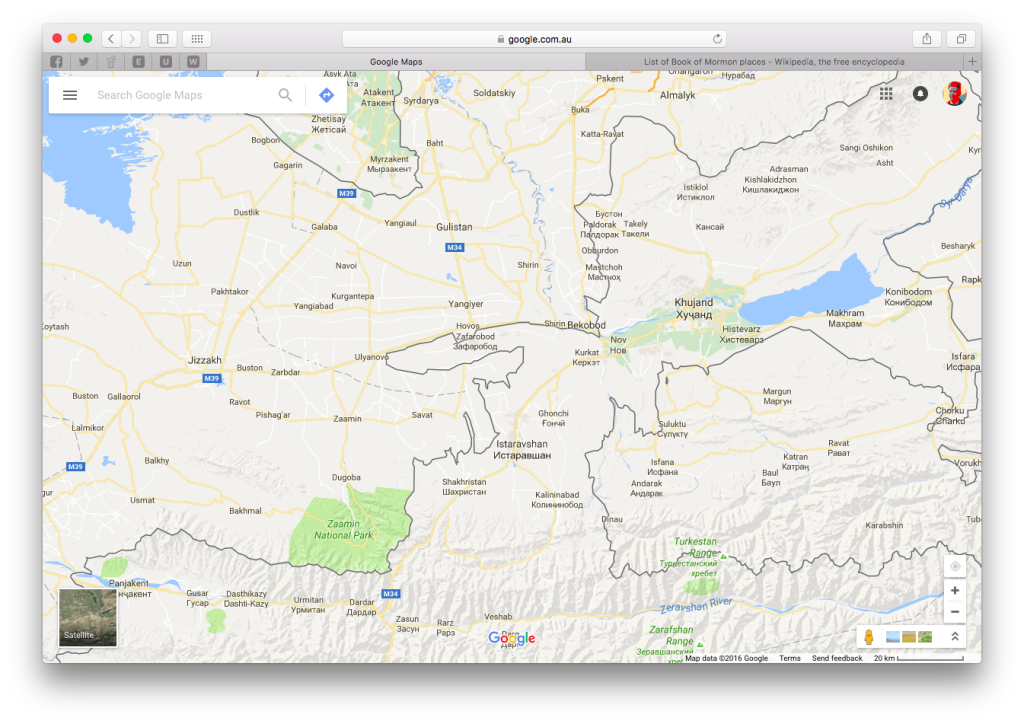
And the result:

Seventy freaking place names, and I can’t find a good match. Although Kishlakidzon at least has a Kish– in it. I’ve been as generous as I can, but the matches are pathetic.
Let’s give it one more try, this time in South America. This is the one place where we could expect a few decent matches, right?
I’m putting the pin down here:
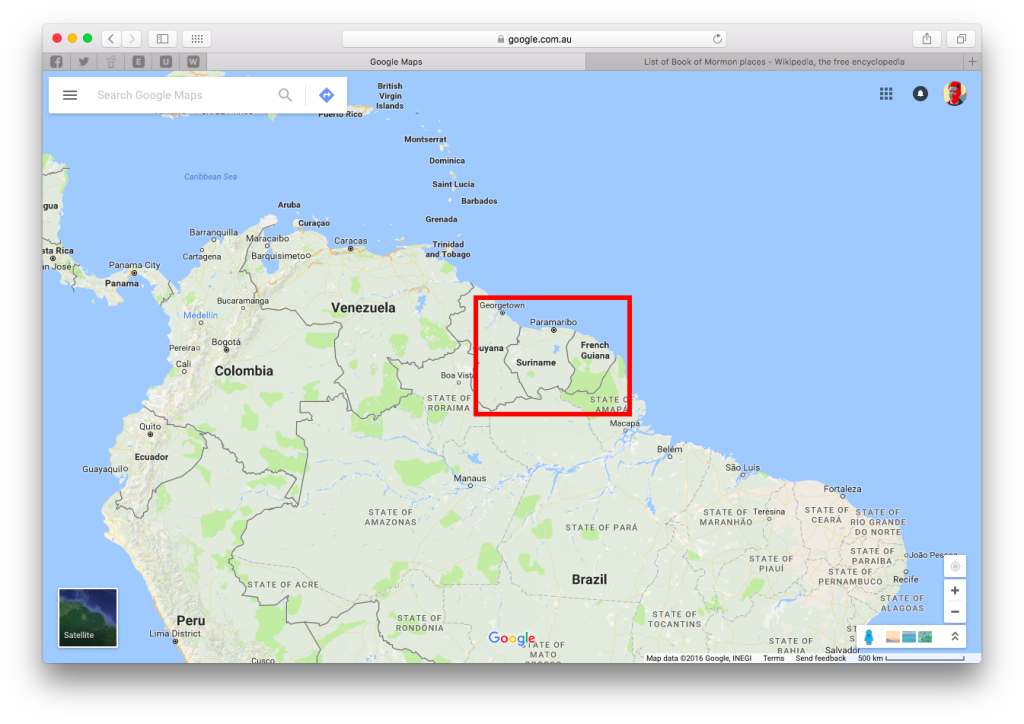
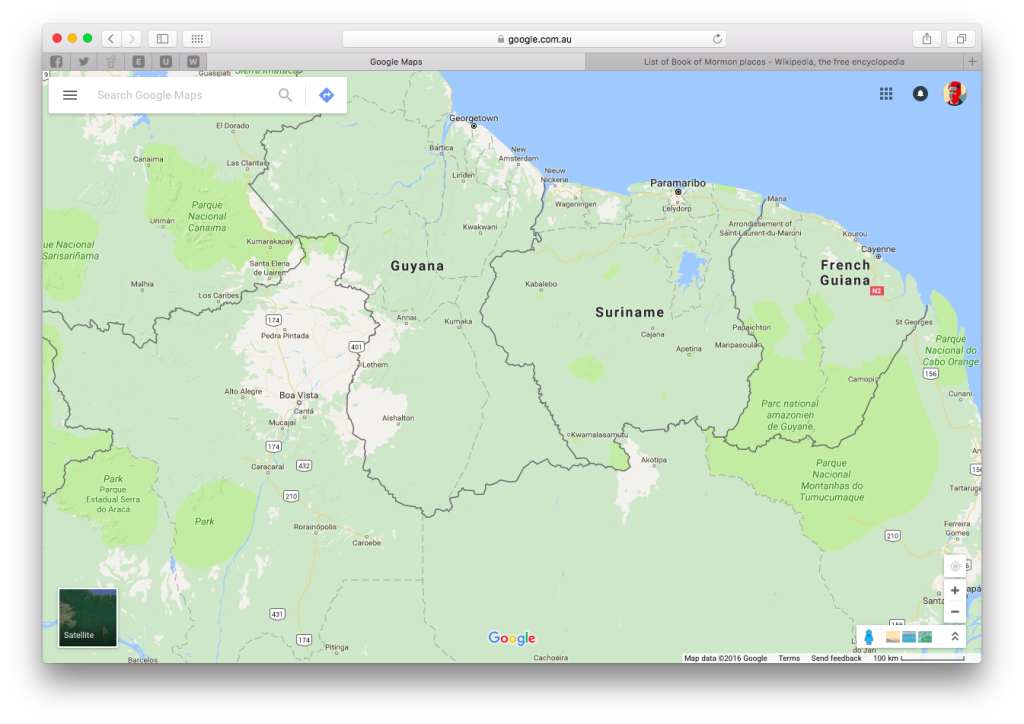
And the result:
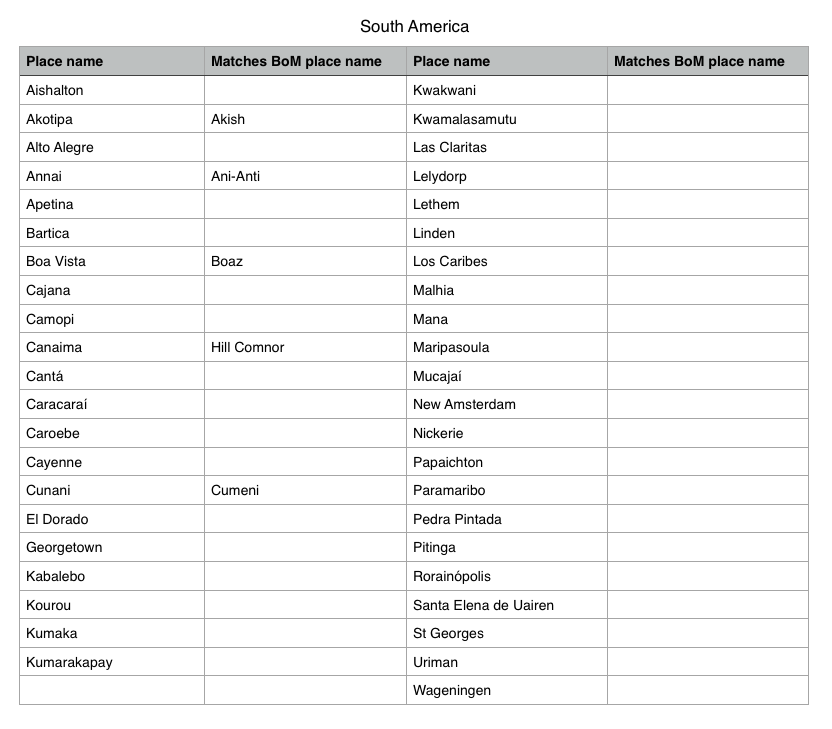
We get Annai and Ani-Anti, which is less-than-inspiring, given the lack of complexity. I matched Cunani and Cumeni, which I think was pretty generous. Other than that, there’s nothing. Check the list and let me know if you disagree. If you can do a better job, go for it.
I tried. I really tried. I thought I could get lots of matches for Book of Mormon names, no matter where I looked. Instead, the list from the CES Letter is way better than mine. I have to admit that this angle on Book of Mormon place names is more viable than I thought.
Did Joseph Smith (and/or friends) pull local place names when writing the Book of Mormon? I’m listing this as:


Recent Comments